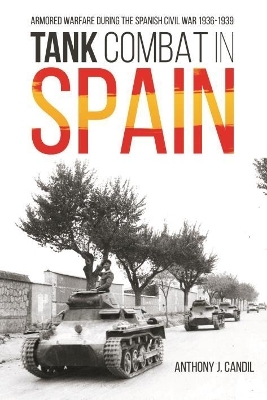
Tank Combat in Spain
Casemate Publishers (Verlag)
978-1-61200-970-4 (ISBN)
Although Spain had been for many years on the periphery of the great affairs of Europe, within a few months of the Civil War breaking out in 1936, three out of the four major European powers - Italy, Germany, and the Soviet Union - decided to intervene. Spain turned out to be the perfect proving ground to carry out controlled, realistic experiments with live weapons and troops.
This book covers the theories of the three main contributors that provided armour to the warring parties in the civil war, how those contributions shaped combat, and how the lessons learnt were then applied to tank combat in World War II. The use of tanks in the Spanish Civil War wedded traditional war to modern technology. The fighting in Spain did not offer any easy answers, however, to the question of infantry-armour cooperation, primarily because the tanks supplied were not very worthy and had been supplied in small numbers, even though the Republicans organized an ‘armoured division’. The situation for the tanks on the Nationalist side was so bad in practical terms that they re-used captured Russian armour in their units.
Tank employment in Spain did offer many lessons, but the lessons did not always lie in what was done or accomplished but precisely on what was not done and was not accomplished.
As a senior Armor officer in the Spanish Army, Anthony J. Candil had direct experience of the struggle of the tank concept in Spain, not then to replace the horse anymore, but to establish the armor as the primary combat arm in mobile warfare, and to create an armored corps within the Spanish ground forces.
Preface
A QUICK APPRAISAL OF THE MILITARY OPERATIONS
FOREIGN INTERVENTION
Part One: The Background
The beginning: the early days of tanks in the Spanish Army
Organization and structure of Armor in the Spanish Army on the eve of the Civil War
Part Two: Foreign Aid Arrives
Soviet Participation
The Italian aid and the Volunteer Corps
Germany enters the arena
Part Three: Balance of Forces
Organization and Structure of the Nationalist Armored Forces
Organization and Structure of the Republican Armored Forces
Part Four: Operations
The Opening Rounds: Blitzkrieg “Franco’s style”
On the Move: Republican armor always “not enough” Stalemate and Attrition
The End: The Battle of the Ebro and the Catalonia offensive
Antitank warfare
Logistics
TANK MAINTENANCE ON THE NATIONALIST SIDE AND THE SERVICE FOR WAR EQUIPMENT RECOVERY
TANK COMBAT SERVICE SUPPORT IN THE PEOPLE’S ARMY OF THE REPUBLIC
A KEY FEATURE: THE REPUBLICAN TANK SCHOOL AT ARCHENA
Part Five: Aftermath
The Experience Reconsidered: Conclusions
A Reappraisal on the Equipment and Armament
SOVIET EQUIPMENT
ITALIAN EQUIPMENT
GERMAN EQUIPMENT
A SPECIAL CASE: CAPTURED RUSSIAN TANKS IN SERVICE WITH THE SPANISH NATIONALIST ARMY
RESUME OF TANKS SUPPLIED BY FOREIGN POWERS
Epilogue
Gallery
Spanish pre-war equipment
Italian Aid
German Aid
Russian aid
Russian tanks captured by the Nationalist Army
Additional Bibliography and further recommended reading
| Erscheinungsdatum | 05.05.2021 |
|---|---|
| Zusatzinfo | 24-page plate section |
| Sprache | englisch |
| Maße | 152 x 228 mm |
| Themenwelt | Geschichte ► Allgemeine Geschichte ► Neuzeit (bis 1918) |
| Geschichte ► Allgemeine Geschichte ► 1918 bis 1945 | |
| Geisteswissenschaften ► Geschichte ► Regional- / Ländergeschichte | |
| ISBN-10 | 1-61200-970-0 / 1612009700 |
| ISBN-13 | 978-1-61200-970-4 / 9781612009704 |
| Zustand | Neuware |
| Haben Sie eine Frage zum Produkt? |
aus dem Bereich


